While several states provide limited subgroup data, Arkansas publicly reports robust homeschool participation data by year, county, student grade, and gender.
History
Arkansas, located in the southern United States, legalized homeschooling in 1985. The number of homeschooled students has steadily increased over the past 20 years. Homeschool participation rates doubled in Arkansas during the pandemic.
Regulation
Arkansas supports parents of students ages 5-17 with a Home School Office, and a dedicated webpage designed to support the homeschool parent. The site provides this informative fact sheet on homeschool requirements in the state. Arkansas offers one option for homeschooling. Families choosing to homeschool their children must submit an Intent to Homeschool form to the Arkansas Department of Education annually. There are no requirements regarding instruction time, required subjects, or record keeping. Parents do not need to be certified or hold a high school diploma. However, the law does not allow for noncustodial adults to homeschool other people’s children. The state required homeschool students take an annual assessment until 2015, but is no longer required. Students may take the state-funded PSAT.
Arkansas provides multiple pathways for nonpublic students to access public school offerings through an explicit statute. For example, district schools must provide access to courses to all students in the state, including those homeschooled. Further, there are no course or funding limits. However, this policy does not currently include extracurriculars. Homeschooled students with special needs qualify for the same services as students in private schools.
State Data
In 2000, the Arkansas DOE reported over 11,000 homeschooled students. By 2010, homeschool enrollment increased to just over 16,000 students. Growing steadily, by 2019, Arkansas had 22,000 registered homeschooled students. In 2020-21, the reported number grew to over 30,000 homeschooled students, accounting for approximately 6% of Arkansas’ K-12 students, up from 3%. Some districts, such as Eureka Springs and Searcy, have homeschool participation rates as high as 20%.
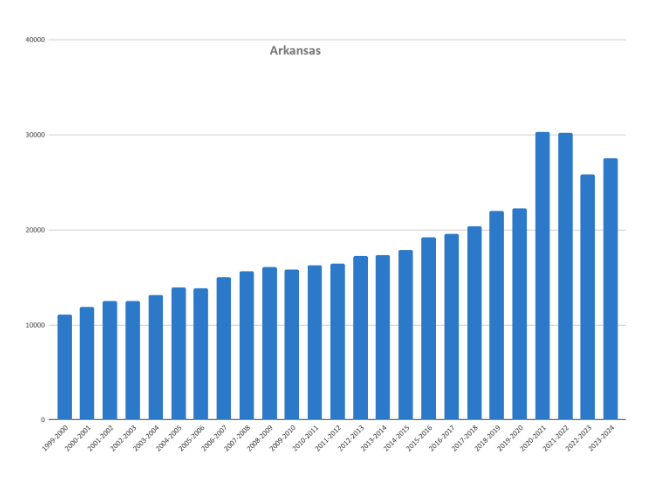
Compared to the U.S. Census estimates of 6.8% of families in the spring of 2020 and 10.3% by the fall, these estimates are reasonable given the actual participation information in the chart. This is just under the national average of 11.1% at the time. Based on U.S. Census data, our calculations indicate that about 6.89% of K-12 students in Arkansas were homeschooled during the 2022-23 school year, and 8.16% during the 2023-24 school year. Due to survey changes, the data from 2020 reflects the percentage of households, while the data from following years reflects the percentage of students.
Arkansas is one of a few states that provides participation information by subgroups. For example, while about 6% of the total state K-12 population homeschools, there are regions where that percentage exceeds 20%. Homeschool participation is equally divided by gender. Post-pandemic growth appears to be driven by younger students in early grades. For example, in 2022, there were 3,000 kindergarten students, 2,000 7th-grade students, and only 1,200 12th-grade students. (See our disaggregated data for details.)
Cross-Sector Comparison
During the 2019-20 academic year, 3.9% of Arkansas’ K-12 students were homeschooled. Homeschool participation in the state is about half that of private school students (8.1%). A larger portion, 6.1%, of Arkansas students attended a charter school. During the 2021-22 academic year, 5.6% of Arkansas’ K-12 students were homeschooled. Homeschool participation in the state was slightly higher than the 4.3% of private school students. A larger portion (7.8%) of Arkansas students attended a charter school.
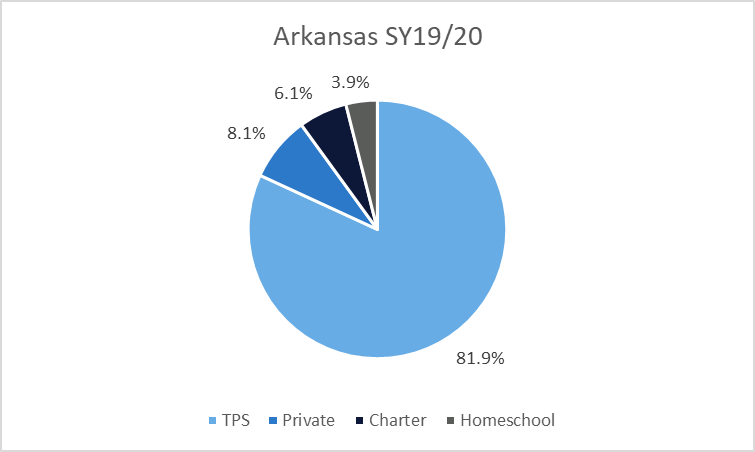
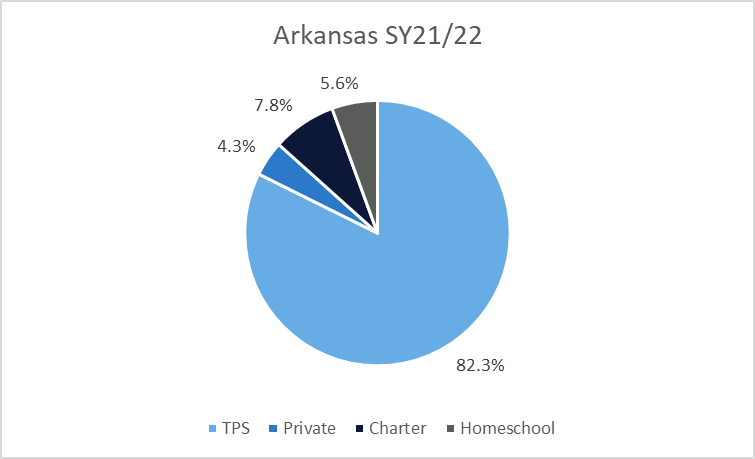
School Choice Context
In addition to homeschooling, parents in Arkansas have various educational choices available through open enrollment. These options include traditional public schools (with some inter- and intra-district choice), vouchers, charter schools, magnet schools, and tax credit scholarships for private schools under the Succeed Scholarship Program. On March 8, 2023, Governor Sarah Huckabee Sanders signed the Arkansas LEARNS legislation into law, creating the Children’s Educational Freedom Account Program, an educational savings account (ESA). Families participating in the program can use public funding to pay for private tuition or approved educational expenses. The planned expansion of The Educational Freedom Account Program includes homeschooled students by 2025.
Commentary
It will be interesting to see how homeschool participation in Arkansas changes as the new universal Education Savings Account (ESA) rolls out over the next several years. It could be that homeschool participation declines as families have increased access and financial means to make other choices. It could also be that more families will have the money to choose homeschooling.
Arkansas is a large, rural state, so the ESA may not be enough to provide access to private school choice if no private schools exist near families. On the other hand, families can access virtual options and could create microschools with ESA funds. As such, increased study on the trends in this state is needed.
Of note, the Fact Sheet provided by the state is a detailed resource aimed at supporting homeschool families. It could serve as a model for other states to improve transparency and help parents navigate homeschool requirements and resources in their states.
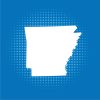
-
10.3% K-12 Students
Around 10.3% of families in Arkansas homeschooled during the height of the pandemic (Fall 2020).
-
1985 Legalized
Homeschooling was legalized in 1987 in the state of Arkansas.
-
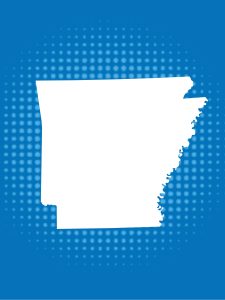
-
More Information
10.3% K-12 Students
Around 10.3% of families in Arkansas homeschooled during the height of the pandemic (Fall 2020).
1985 Legalized
Homeschooling was legalized in 1987 in the state of Arkansas.

More Information
Last updated March 2025.